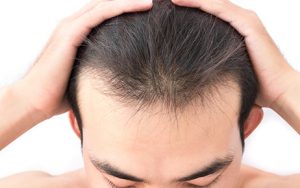 If you want to get a complete picture of your health, you’ll need a comprehensive physical exam, an array of tests, and the expertise of your doctor. But medical charts and lab results are not the only places you can get insights about your well-being. Your body has plenty of ways of telling you if something may be wrong. One way it does so is through the condition of your scalp and hair.
If you want to get a complete picture of your health, you’ll need a comprehensive physical exam, an array of tests, and the expertise of your doctor. But medical charts and lab results are not the only places you can get insights about your well-being. Your body has plenty of ways of telling you if something may be wrong. One way it does so is through the condition of your scalp and hair.
Often, differences in your’s hair’s condition don’t mean much beyond the fact that your genes or other environmental or lifestyle factors are causing you to lose hair. Other times, though, sudden or unexpected changes in your hair health – from differences in strength, texture, or color to significant shedding – can be early warning signs about other health problems that need your attention.
The following are just a few things your scalp and hair may be telling you about your health:
- Dandruff merely is a visible sign that the skin cells on your scalp are producing new cells quicker than normal, resulting in excessive shedding of dead skin cells, which take the form of dandruff flakes. Dandruff can be connected to a variety of treatable conditions such as eczema, psoriasis, stress, seborrheic dermatitis, or vitamin B deficiency.
- Graying hair. While greying hair is usually the result of genetics and the passing of time, premature greying can be caused by an array of health problems, from stress to anemia, thyroid issues, vitamin B12 deficiency, and vitiligo.
- Brittle hair. A rare condition call Cushing’s Syndrome can develop when your body is exposed to high levels of the hormone cortisol for an extended time. One symptom of this condition is brittle hair.
- Thyroid problems. When our thyroid glands don’t work correctly, they can cause an array of health problems, including hair loss. Both hypothyroidism (production of too few hormones) and hyperthyroidism (production of too many hormones) can cause hair to fall out because of the impact these imbalances have on the development of a hormone called dihydrotestosterone (DHT). This hormone, a synthesized version of testosterone, plays a role in the development of sexual organs and secondary sexual characteristics, including physical appearance. Unlike testosterone, however, too much DHT disrupts the natural growth cycle of hair and can cause hair follicle shrinkage or elimination, resulting in shedding or thinning hair.
- A lack of iron – anemia – is one of the chief causes of dietary-related hair loss. Low iron levels restrict proper blood flow – reducing the amount of growth-stimulating nutrients our follicles need. Iron-rich foods such as spinach, kale, broccoli, and other leafy greens can boost your iron intake and help feed your hair.
Ready to Do Something About Your Hair Loss? Schedule an Appointment for a Hair Loss Evaluation Today
If you are concerned about your hair health or are experiencing hair loss and you’re ready to do something about it, we invite you to schedule a hair loss evaluation at the Hair Transplant Institute of Miami. To receive your personalized assessment and treatment plan, contact us online or call our office directly at 305-925-0222.

